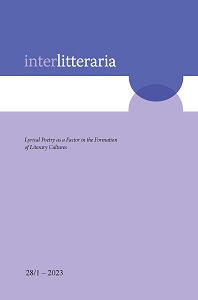The Transition from Song to Poetry in Latvian Literature in the Second Half of the 19th Century
The Transition from Song to Poetry in Latvian Literature in the Second Half of the 19th Century
Author(s): Māra GruduleSubject(s): Music, Latvian Literature, 19th Century, Theory of Literature, Sociology of Literature
Published by: Tartu Ülikooli Kirjastus
Keywords: orality; literacy; Gotthard Friedrich Stender; Latvian literature; national awakening;
Summary/Abstract: The Latvian nation is a singing nation. The Singing Revolution and similar song- and singing-related references are traditionally associated with the image of Latvians. The origins of written Latvian are also related to song: the oldest known Christian song in Latvian, dating from 1530, is also one of the oldest examples of Latvian-language text. In the second half of the 18th century, as a result of transferring from a German to a Latvian cultural space, a new genre of song was created by the German pastor Gotthard Friedrich Stender, the secular, didactic and sentimental ziņģe (a term coined from the German verb singen, ‘to sing’). As the level of education among Latvians was low and most information spread by word of mouth, the German pastors and the first generation of Latvian poets made use of ziņges as an informative tool. Around the middle of the 19th century, the Latvian national revival began. Without denying the importance of Latvian folk songs in the creation of national culture, the main focus of this article is on the secular ziņģes that were adopted from the German literary tradition, which up until the second half of the 19th century were a favourite tool for entertainment (singing) and spreading information orally. As the level of literacy among Latvians rose, the ziņģes receded to the periphery of the literary landscape, paving the way for a new concept for denoting a rhythmic text that was for the first time not melody-bound: dzeja, or ‘poetry’. The emergence of the new concept in 1869, which was related to the Latvian national revival and the formation of a national literary culture, at the same time also marked a turning point from orality to literacy in Latvian society
Journal: Interlitteraria
- Issue Year: XXVIII/2023
- Issue No: 1
- Page Range: 49-63
- Page Count: 15
- Language: English

